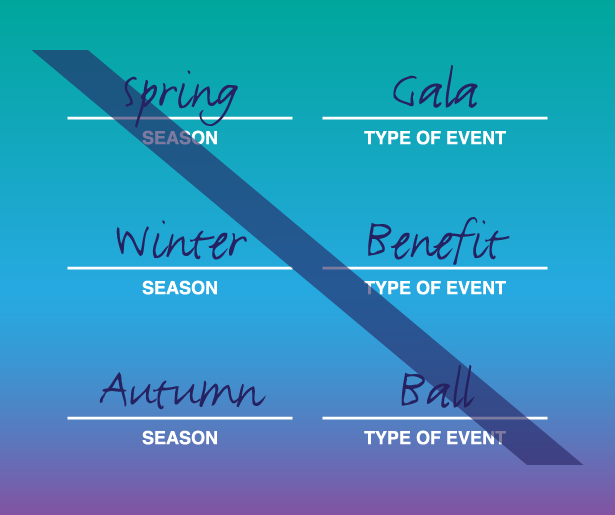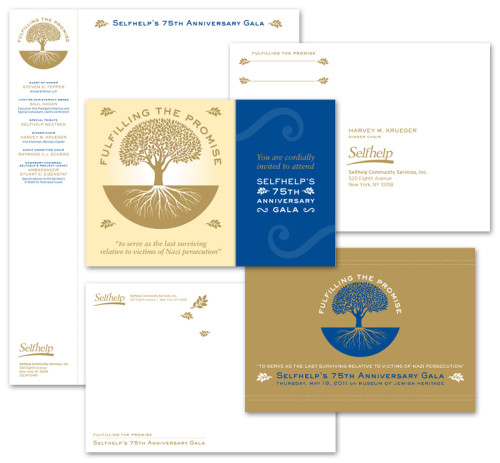How to create exciting nonprofit event themes: 4 steps
You and I both know there’s no shortage of nonprofit events. They’re a fantastic way for organizations to celebrate their achievements, honor those who have dedicated themselves to the cause and connect with supporters.
Yet, after a while all of the nonprofit event themes can start to sound alike — Spring Gala, Winter Wonderland, Celebrating Our Impact, An Evening Under the Stars, Charity Ball, Annual Dinner Dance, and the list of generic names goes on. How can you make your event different and, therefore, memorable with so many organizations hosting similar events?
You need to create a theme that is unique to your organization and its mission. In his article for Nonprofit Hub, titled How to Sleep Better After Your Next Nonprofit Fundraising Event, Lincoln Arneal states, “The branding is what makes your fundraising dinner different than all the others out there … so find a theme that is unique to your organization and run with it. The more cohesive and comprehensive the theme is the better the evening will come off. Own your theme and elevate your event.” I couldn’t agree more!
The theme is the first tool you have to get your team on the right page and start planning your event collateral, not to mention get supporters talking about your event. In the early phases of planning — when you’re building the committee and reaching out to potential honorees with little more than the date and time — an exciting theme will prove invaluable.
Here are 4 simple tips to develop nonprofit event themes that create buzz:
1) Remember your mission
I mean this very literally. Reread your organization’s mission statement and look at the language. The work your organization does on a daily basis is the very reason your volunteers and donors support you, so it’s also the reason they will want to celebrate your organization at an event. If you work with children, animals, food, science, education, etc., include that subject in the theme.
Here are some examples of organizations that did this right:
Thurgood Marshall College Fund (serving students) — “Developing Minds, Delivering Dreams Awards Gala”
City Harvest (serving hungry New Yorkers) — “Bid Against Hunger”
Tomorrow’s Hope Foundation (serving children) — “Stars for Students Scholarship Gala”
New York Housing Conference (serving the affordable housing industry) — “Uplifting Communities Awards Luncheon”
2) Add a descriptor
This step is pretty basic, but it gives your audience some context as to the type of event you’re throwing. Is it a silent auction, luncheon, golf tournament, dance party, concert, masquerade, black tie dinner, ballet, etc.? Let your audience know either in the title of the event or with a subhead.
People will then understand what your event is all about and will be able to get on board more quickly. They can then spread the word about your event with their network more readily. Moreover, you won’t have nearly as many questions about attire or mood (festive, serious, silly) because guests will know what they’re signing up for.
Here are examples of organizations that have done this perfectly:
City Harvest (silent auction) — “Bid Against Hunger”
Covenant House (comedy night) — “STAND UP for Homeless Kids”
Save-A-Pet (gala) — “Annual Fur Ball”
American Friends of the Hebrew University (dinner) — “Torch of Learning Award Dinner”
3) Avoid overused words that hold little meaning
Put another way, avoid using words or phrases that are so broad or vague that they lose all meaning. For instance, Impact Awards, Creating Opportunity, Improving Lives. Shouldn’t all nonprofits be making some sort of impact and improving lives? It’s time to get more specific.
When organizations serve several audiences and/or have many layers to their mission, the tendency is to rely on big, broad words that encompass all aspects of their work. Instead, I challenge you to find the underlying theme in your work. What is the one thread that ties all of your work together? That’s where your event title will come from. Another thing you might want to consider is highlighting one particular program or service area.
For LISC New York City (Local Initiatives Support Corporation), an NPO that invests in housing, health, education, public safety and employment, it’s difficult to sum up their work in a few words. However, all of their investments are made with one goal in mind — to create good places to live, work, do business and raise children. Put even more simply, their goal is to create stronger communities. They can highlight one service area from their list (and in 2014 they did just that with the health-focused theme “Building Greener, Staying Healthier”) or they can create a theme based on the underlying thread of building stronger communities (in 2015 they did this with “Paving the Path to Prosperity”). Either way, they avoid the tired and generic “A Better Tomorrow” as a way of expressing their goals.
4) Check to see if the theme is unique
Here’s an easy way to do this. Swap out the name of your organization with any other organization out there. Does the theme still work? If so, I’m afraid your theme is still too generic.
“A Night of Broadway Stars” lets your audience know what the event is all about, but it doesn’t say anything about your organization. Any nonprofit could use this as their event title — and believe me, they do!
As for your 5th, 10th, 50th (insert year here) Anniversary Gala, you guessed it. Still too generic. I am all for celebrating anniversary years, but be sure to inject some personality into it. Brooklyn Workforce Innovations is a workforce training organization that just celebrated its 5th year. They wisely used the tagline “5 Years, 5,000 Jobs” to mark the milestone. Selfhelp Community Services added “Fulfilling the Promise” to their 75th Anniversary Gala title, in order to reference their historic promise “to serve as the last surviving relative to victims of Nazi persecution.”
So there it is. You now have 4 tips to help you create stronger, more ownable themes. I encourage you to put these tips into practice today and start differentiating your next event from all the others.
Do you have any good themes to share — or any generic ones to avoid? I’d love to hear your examples in the comments below.



 PRINT
PRINT

